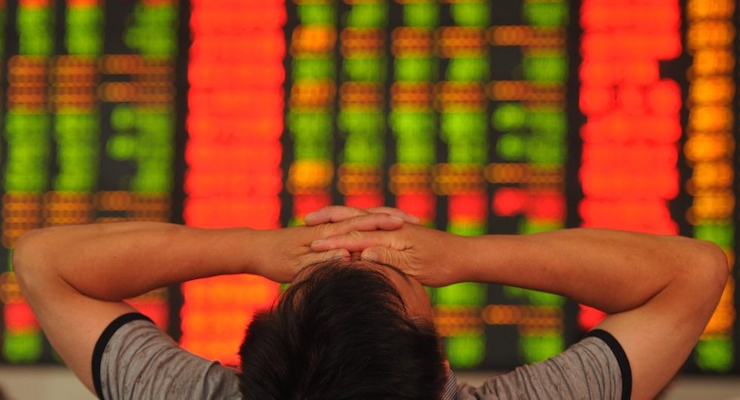

A stock investor reacts as he checks prices in a brokerage house in Fuyang in central China’s Anhui province, 08 July 2015. Chinese stocks plunged on 08 July, with the benchmark Shanghai Composite Index closing down 5.9 percent despite new measures to shore up share prices. The Shanghai Composite Index has tumbled by around 30 per cent since a peak on 12 June. (PHOTO: EPA/AN MING CHINA OUT)
Is the third time the charm, at least for bailouts? First, we had the TARP bailout in the United States, and that turned out to be a corrupt mess. Second, we had the Greek bailout, which has squandered hundreds of billions of euros to prop up a welfare state. Now we have a third big bailout, with China seeking to stabilize that nation’s faltering stock market. So anybody want to guess how this will work out?
To put it mildly, the Wall Street Journal does not have a favorable opinion of this financial market intervention.
Beijing…officials pumped public money into the market. It hasn’t worked; the Shanghai Composite Index closed Thursday at 3661, 29% below its June peak. …Peking University economist Christopher Balding has added up the bailout and stimulus measures announced since the market panic started in late June. They total $1.3 trillion, or more than 10% of GDP.
So why is this a bad thing?
For two reasons, as the WSJ explains. First, it’s an unjustified wealth transfer. Second, it creates an economic environment contaminated by moral hazard.
Investors who bought when the market was already frothy are getting a chance to exit with some of their profits intact. But Chinese who don’t own stocks are justified in asking why they must subsidize their fellow citizens’ poor decisions. Mr. Balding’s spreadsheet shows that the market-rescue measures represent a huge transfer of wealth to investors who should have been prepared to shoulder the risks when they bought shares. The failed bailout reinforces the expectation that Beijing will attempt to manage the financial markets in the future. This moral hazard means the volatility will continue, along with the costs of future bailouts.
You won’t be surprised to learn that I share the Wall Street Journal’s skepticism. In a recent interview with Neil Cavuto, I said the Chinese government (like just about all governments) is too focused on short-run pain avoidance.
In other words, by trying to prop up markets in the short run, I think the Chinese government will cause a far greater amount of economic pain in the long run.
Two other points from the interview deserve highlighting.
- China’s economy needs more economic liberalization (as opposed to the snake oil being peddled by the IMF) if it hopes to become a first-world nation. While there’s been a lot of progress since the wretched deprivation and poverty of Mao’s era, China is still way behind the United States and other nations with more capitalistic systems. Hong Kong, Singapore, and Taiwan are appropriate role models.
- Whenever folks on the left point to a “success story” that ostensibly proves big government and central planning are more successful that capitalism, it’s just a matter of time before they’re proven wrong. Some of them were delusional enough to think the Soviet Union was economically successful (see bottom of this post) and events proved them wrong. As I pointed out in the interview, some of them thought Japan’s model of central planning was the ticket for prosperity and events proved them wrong. More recently, some of them have argued that China’s state-driven economy was a role model and they’re now being shown to be wrong.
P.S. Let’s close with some economic humor.
Fans of old-time comedy are probably familiar with the famous who’s-on-first exchange between Abbott and Costello.
Well, here’s a modern version of that exchange that showed up in my mailbox yesterday, only it deals with joblessness. I won’t strain credibility by asserting it’s as funny as the original sketch, but it does indirectly highlight the fact that we should focus primarily on labor force participation since that measure how many people are producing wealth for the nation.
COSTELLO: I want to talk about the unemployment rate in America.
ABBOTT: Good Subject. Terrible times. It’s 5.6%.
COSTELLO: That many people are out of work?
ABBOTT: No, that’s 23%.
COSTELLO: You just said 5.6%.
ABBOTT: 5.6% unemployed.
COSTELLO: Right, 5.6% out of work.
ABBOTT: No, that’s 23%.
COSTELLO: Okay, so it’s 23% unemployed.
ABBOTT: No, that’s 5.6%.
COSTELLO: Wait a minute! Is it 5.6% or 23%?
ABBOTT: 5.6% are unemployed. 23% are out of work.
COSTELLO: If you are out of work, you are unemployed.
ABBOTT: No, Congress said you can’t count the “out of work” as the unemployed. You have to look for work to be unemployed.
COSTELLO: But they are out of work!
ABBOTT: No, you miss his point.
COSTELLO: What point?
ABBOTT: Someone who doesn’t look for work can’t be counted with those who look for work. It wouldn’t be fair.
COSTELLO: To whom?
ABBOTT: The unemployed.
COSTELLO: But ALL of them are out of work.
ABBOTT: No, the unemployed are actively looking for work. Those who are out of work gave up looking; and if you give up, you are no longer in the ranks of the unemployed.
COSTELLO: So if you’re off the unemployment rolls, that would count as less unemployment?
ABBOTT: Unemployment would go down. Absolutely!
COSTELLO: The unemployment rate just goes down because you don’t look for work?
ABBOTT: Absolutely it goes down. That’s how it gets to 5.6%. Otherwise it would be 23%.
COSTELLO: Wait, I got a question for you. That means there are two ways to bring down the unemployment number?
ABBOTT: Two ways is correct.
COSTELLO: Unemployment can go down if someone gets a job?
ABBOTT: Correct.
COSTELLO: And unemployment can also go down if you stop looking for a job?
ABBOTT: Bingo.
COSTELLO: So there are two ways to bring unemployment down, and the easier of the two is to have people stop looking for work.
ABBOTT: Now you’re thinking like an economist.
COSTELLO: I don’t even know what the hell I just said!
ABBOTT: Now you’re thinking like a politician.
P.P.S. While economist deservedly get mocked, we’re not totally useless. We occasionally show a bit of cleverness.
[mybooktable book=”global-tax-revolution-the-rise-of-tax-competition-and-the-battle-to-defend-it” display=”summary” buybutton_shadowbox=”true”]





